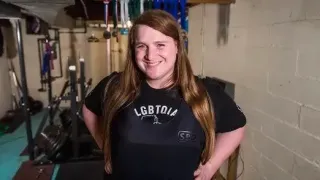
5 hours ago
Chokehold on Porn: UK’s New Ban Sparks Debate on Pleasure, Power, and Protection in Queer Communities
READ TIME: 4 MIN.
The UK government has announced a sweeping new ban on online pornography depicting strangulation, making it a criminal offense to possess or publish such content. This move, part of a broader crackdown on digital abuse and violence, is being framed as a necessary step to protect women and girls from harmful sexual norms perpetuated by online media. “Viewing and sharing this kind of material online is not only deeply distressing, it is vile and dangerous,” declared Technology Minister Liz Kendall, adding that those who promote such content are “contributing to a culture of violence and abuse that has no place in our society” .
For many in the LGBTQ+ community, particularly those who inhabit the vibrant and complex world of queer kink, the news lands with a mix of relief, skepticism, and concern. Is this about policing pleasure, or genuinely protecting people from harm? And what does it mean for queer sexual expression, which has always existed under the microscope of moral panic and state intervention?
Let’s get real: choking, or breath play, occupies a complicated space in queer sexual cultures. For some, it’s a consensual act—a way to explore trust, power dynamics, and pleasure on their own terms. For others, especially survivors and those wary of the normalization of violence, it’s a threat amplified by media and the mainstreaming of porn tropes.
The government’s move comes after an Independent Porn Review led by Baroness Gabby Bertin, which found that strangulation during sex has become a “sexual norm” online, often portrayed as safe despite evidence that it’s anything but. “There is no such thing as safe strangulation; women cannot consent to the long-term harm it can cause, including impaired cognitive functioning and memory,” said Andrea Simon, Director of the End Violence Against Women Coalition (EVAW), emphasizing the risks and the urgent need for change .
But here’s where things get queerly complicated: the mainstream portrayal of choking in porn rarely reflects the nuanced, negotiated consent found in many LGBTQ+ kink spaces. Queer communities have long been at the forefront of educating about risk-aware consensual kink, safety protocols, and the difference between fantasy and reality. The ban, while well-intentioned, risks lumping all depictions—consensual or otherwise—into the same category, potentially criminalizing expressions of sexuality that are vital for many LGBTQ+ people.
The announcement has split opinion among queer activists, sex educators, and performers. Some applaud the focus on protecting vulnerable people from coercion and abuse, especially given the documented rise in violence linked to “porn-inspired” sexual norms. Others worry the law will be used as a blunt instrument, further stigmatizing LGBTQ+ sexualities and kink practices that already face misunderstanding and prejudice.
For trans, nonbinary, and gender-nonconforming people—who report disproportionately high rates of sexual violence and media misrepresentation—the stakes are particularly high. The policing of sexual content often translates into the policing of bodies and identities, with platforms and laws failing to recognize the difference between exploitation and genuine, consensual expression.
“Whenever laws are passed about sexual content, queer people are almost always collateral damage,” says Jamie, a nonbinary kink educator based in London. “We lose spaces where we can talk openly and safely about what turns us on, what keeps us safe, and how we navigate intimacy in a society that’s still learning what consent means.
Tech platforms will be required to take “proactive steps” to prevent users from accessing banned content, including stricter moderation and age verification tools. Those who fail could face fines up to £18 million or 10 percent of global revenue . This raises urgent questions for queer creators, performers, and independent porn sites—many of which already battle shadowbans, payment processor discrimination, and algorithmic censorship.
Queer porn historically offers a counter-narrative to mainstream sexual scripts, emphasizing agency, negotiation, and representation of bodies and desires outside the cis-heteronormative mainstream. Will this law erase those stories, or will it force the industry to find new ways of depicting kink, pleasure, and risk with transparency and care?
“It’s not just about what’s banned—it’s about what survives,” says Kai, a trans adult performer. “We’ve spent years building platforms where our kinks aren’t pathologized, where consent is visible and real. If those spaces disappear, so does our ability to educate and empower each other.”
While the ban is part of a broader “Plan for Change” to halve violence against women and girls, critics say more is needed than legal crackdowns. Education, dialogue, and a nuanced understanding of consent are crucial—especially for young people navigating sexuality in a digital world saturated with extreme and often misleading images.
The government’s own review acknowledged that porn has helped establish strangulation as a sexual norm, with young men increasingly believing it’s “safe” because it’s shown as non-fatal online . But changing norms requires more than censorship: it demands honest conversations about pleasure, power, and the risks—and joys—of queer sex.
For LGBTQ+ audiences, the debate is about more than porn. It’s about visibility, autonomy, and the ongoing struggle to define our own boundaries in a world that alternates between fetishizing and fearing us. The ban may protect some, but it also risks silencing others. As queer communities have always known, the answer isn’t less conversation—it’s more.
As the amendment to the Crime and Policing Bill moves forward, queer advocates urge lawmakers to include LGBTQ+ perspectives in the conversation, recognize the difference between violence and consensual kink, and protect spaces where sexual health, safety, and pleasure can be discussed openly. The hope is for regulation that supports, not suppresses, the diversity of queer sexuality.
For now, the message from the UK government is clear: “Misogyny will not be tolerated.” The challenge is ensuring that, in rooting out violence, we don’t erase the voices, desires, and rights of those whose sexuality has always been a site of resistance—and resilience.
Because if there’s one thing queer history has taught us, it’s that pleasure and safety are not opposites. They’re a conversation. And it’s one we’re not done having.






